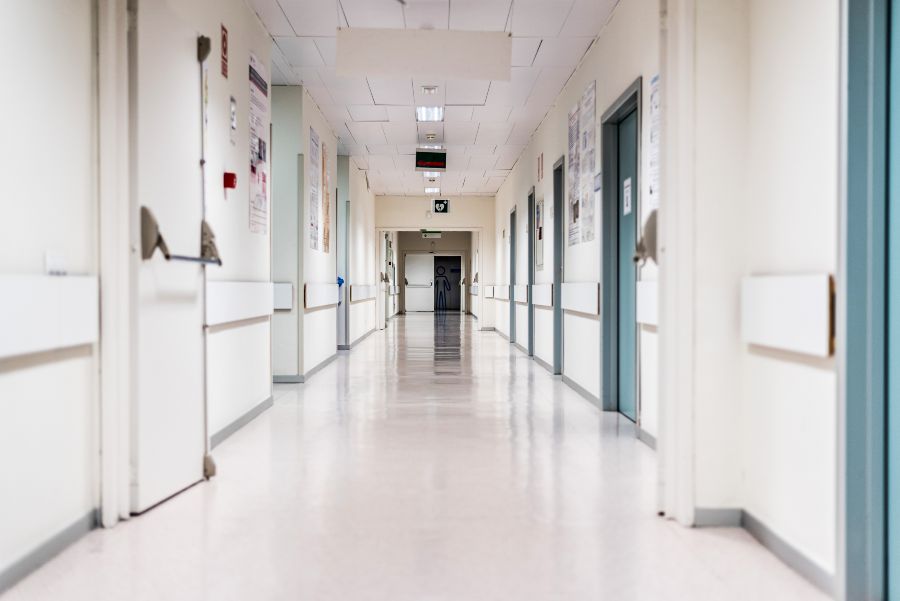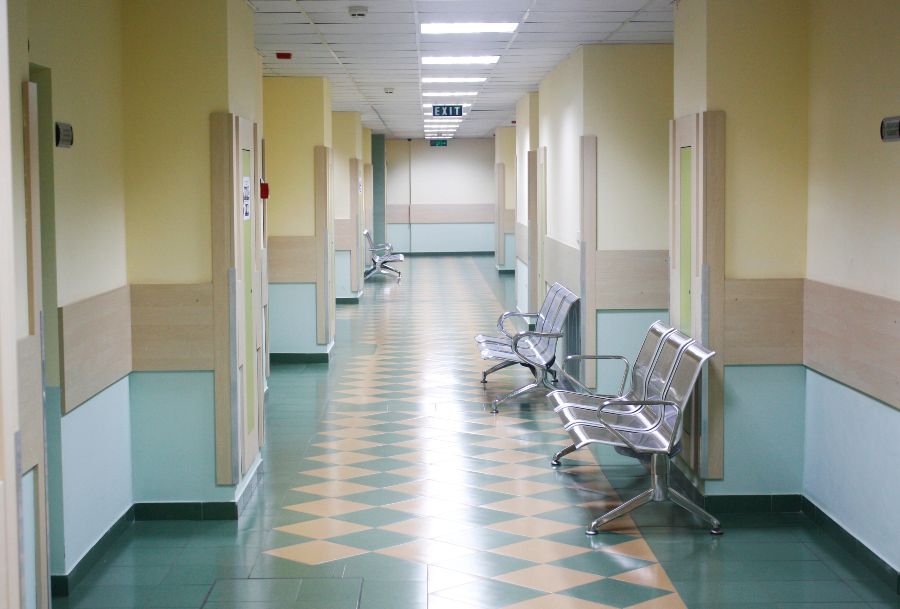What are some of the most important things you need to know when it comes to hospital floor cleaning? Continue reading to learn more.
Cleanliness and hygiene are of critical importance when it comes to hospitals – poor hygiene can compromise the immune systems of vulnerable patients, lead to the spread of infectious diseases, and increase the risk of healthcare-associated infections (HAIs), which can be life-threatening.
However, one aspect that is often overlooked when it comes to cleanliness and hygiene are the hospital floors. Bustling with activity from staff, patients and visitors, they are saturated with heavy foot traffic which brings in dirt, debris, and contaminants from the outside.
But that’s not the only way hospital floors get dirty on the daily. Spills and transfers of bodily fluids from medical procedures, contamination from patients with infectious diseases that transfer to the floor, and improper cleaning practices can all result in incomplete or ineffective cleaning.
In this article, we will tell you everything you need to know about hospital floor cleaning, and the importance of hiring professional hospital cleaning services to ensure that you are meeting all the standards and requirements for cleanliness and hygiene.
So, without further ado, let’s get right into it:
Why is hospital floor cleaning so important?
We already touched briefly on the importance of hospital floor cleaning at the beginning of the article, but now it’s time to get into the details of why it’s absolutely essential for educational institutions:
- Infection control – hospitals and medical institutions are breeding grounds for pathogens, and floors can harbor harmful microorganisms. Proper cleaning helps prevent the transmission of infections, protecting both patients and healthcare staff.
- Patient safety – clean floors reduce the risk of slips and falls, ensuring the safety of the patients and staff. Injuries resulting from falls can have serious consequences, sometimes life-threatening ones, especially for patients who are already unwell.
- Healthcare-associated infections (HAIs) – contaminated floors can contribute to the spread of HAIs, which are a significant concern in healthcare settings. Hospital floor cleaning is a key component of infection prevention strategies.
- Preventing cross-contamination – hospital floors can come into contact with bodily fluids, medications, and contaminants. Thorough cleaning prevents cross-contamination between different areas of the hospital, reducing the risk of disease transmission.
- Aesthetic and psychological impact – clean, well-maintained floors create a more pleasant and reassuring environment for patients and their families. This can positively impact the overall patient experience and contribute to a sense of well-being.
- Compliance and accreditation – healthcare facilities are subject to strict regulations and accreditation standards. Proper hospital floor cleaning is essential to meeting these requirements, ensuring legal compliance and maintaining the hospital’s reputation.
- Effective functioning of medical equipment – clean floors are necessary for the proper functioning of medical equipment, such as wheelchairs, gurneys, and IV stands, which need smooth, debris-free surfaces to operate safely and efficiently.
And last but not least, regular and proper hospital floor cleaning is important because it helps to extend the lifespan of flooring materials, which in turn reduces the need for costly replacements and repairs.
This contributes to cost savings for the healthcare facility, especially considering how much wear and tear happens to hospital floors over time.
How frequently should hospital floors be cleaned professionally?
The frequency of professional hospital floor cleaning can vary depending on the type of institution, the daily foot traffic, the type of flooring, and the specific needs of the facility. However, in most cases, daily cleaning is a must for high-traffic areas, and weekly cleaning is recommended for less frequently used areas.
Daily cleaning
High-traffic areas and patient rooms often require daily cleaning. This includes vacuuming or dust mopping to remove loose dirt and debris, as well as damp mopping with disinfectants to maintain cleanliness and infection control.
Weekly cleaning
Less frequently used areas or spaces with lower foot traffic may be professionally cleaned on a weekly basis. This involves more comprehensive cleaning and may include floor stripping and waxing for certain floor types.
Monthly cleaning
Some areas, such as non-patient areas, hallways, and administrative offices, may only need monthly or quarterly professional hospital floor cleaning. This can involve more intensive cleaning and maintenance procedures to ensure the longevity and appearance of the flooring.
Specialized cleaning
Operating rooms, surgical suites, and critical care areas may have specific requirements for cleaning and disinfection. These areas often require daily or more frequent specialized cleaning to meet stringent hygiene standards.
Emergency cleaning
In case of spills, accidents, or infectious disease outbreaks, immediate and thorough professional cleaning is essential to prevent cross-contamination and infection spread.
What is the cost of professional hospital floor cleaning?
The cost of professional hospital floor cleaning varies based on different factors, from the size and layout of the facility to the type of flooring materials, as well as the frequency of cleaning required.
- Size and layout of facility – the square footage of the hospital, as well as its layout, will directly impact the cost of professional floor cleaning. Larger facilities generally require more time and resources for cleaning as they create additional complexity.
- Type of flooring – different types of flooring, such as vinyl, tile, carpet, or specialty materials, may require different cleaning methods and have varying costs associated with their maintenance – some are harder to maintain than others.
- Frequency of cleaning – hospitals may have daily, weekly, or monthly cleaning schedules. More frequent cleaning can increase costs. If you are not sure what is the ideal cleaning routine for your facility, contact TCS Floors for professional guidance.
- Scope of services – the specific cleaning services required, such as routine maintenance, deep cleaning, or specialized cleaning for operating rooms or critical care areas, will affect the overall cost. Hospital stripping and waxing services won’t have the same cost as regular cleaning.
- Geographic location – the cost of professional cleaning services can also be influenced by the geographic location of the healthcare facility, as labor and operational costs can vary by region.
- Cleaning equipment and supplies – the use of specialized cleaning equipment, such as floor scrubbers or carpet extractors, and high-quality cleaning supplies can impact costs. The exact cleaning equipment needed will be determined by the professional floor care company.
In addition, some hospitals may require additional services, such as floor stripping and waxing, stain removal, or emergency cleanup, which can add to the overall cost.
Can professional floor cleaning help prevent healthcare-associated infections (HAIs)?
Yes, professional hospital floor cleaning plays a crucial role in preventing healthcare-associated infections (HAIs) in hospitals and healthcare facilities.
HAIs are a significant concern, as they can lead to severe complications, extended hospital stays, and increased healthcare costs. Dirty and contaminated floors can be reservoirs for pathogens, and as healthcare personnel and patients move about, these pathogens can be spread to other surfaces and individuals.
Professional floor cleaning employs specialized equipment and disinfection techniques to effectively remove contaminants and pathogens, reducing the risk of cross-contamination and HAIs.
Furthermore, the use of appropriate cleaning agents and disinfectants can eliminate a wide range of microorganisms, contributing to a safer healthcare environment.
Regular, thorough hospital floor cleaning, combined with strict infection control protocols, is a critical strategy in the broader effort to protect patients, staff, and visitors from infectious diseases in healthcare settings.
Get professional hospital floor cleaning with TCS Floors
When it comes to ensuring the highest standards of cleanliness and hygiene in healthcare facilities, getting professional hospital floor cleaning services with TCS Floors stands as a testament to unwavering commitment and expertise.
TCS Floors brings a wealth of experience and a dedicated team of professionals who understand the unique challenges and demands of hospital environments. Our state-of-the-art equipment, eco-friendly cleaning solutions, and rigorous protocols are tailored to meet the stringent requirements of healthcare settings.
With TCS Floors, hospitals can trust in a partner that not only delivers impeccable floor cleaning but also contributes to the prevention of healthcare-associated infections, the safety of patients and staff, and the overall well-being of the healthcare community.
FAQ
How does hospital floor cleaning contribute to regulatory compliance and accreditation requirements?
Hospital floor cleaning is essential for regulatory compliance and accreditation. It ensures a hygienic environment, meeting strict healthcare standards. Compliance prevents legal issues, upholds the facility’s reputation, and assures patients of safe, accredited care.
What measures are in place to ensure patient safety during floor cleaning?
Patient safety during floor cleaning is ensured through several measures. Clear signage warns of wet floors, reducing slip hazards. Cleaning staff use color-coded equipment and practice hand hygiene to prevent cross-contamination. Isolation of cleaning areas minimizes patient exposure, and non-toxic, low-odor cleaning agents maintain air quality.
What steps are taken to prevent cross-contamination during floor cleaning?
Cross-contamination prevention during floor cleaning includes color-coded equipment, disposable materials, and careful segregation of clean and soiled items on carts.
Proper hand hygiene, disinfectant use, and cleaning sequences help maintain hygiene and prevent pathogens from spreading between areas and surfaces.


